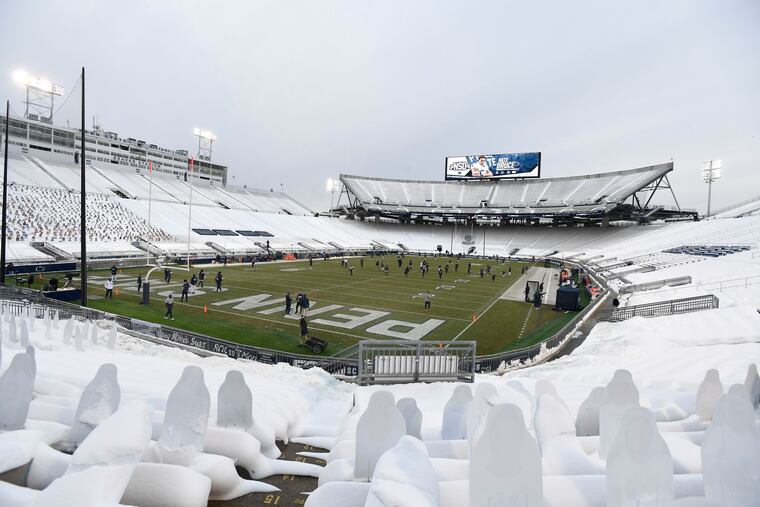State College residents express concerns about a full Beaver Stadium
“I think it’s irresponsible to open Beaver Stadium while the delta variant is going on," one resident says.

STATE COLLEGE, Pa. — In less than three weeks, Penn State will welcome 107,000 fans to Beaver Stadium for the Nittany Lions’ home-opening football game against Ball State.
After not having fans during an abbreviated conference-only 2020 season, the athletic program is dubbing the Sept. 11 game the “107K Family Reunion.”
Next month’s home contest will be the first full-capacity event at Beaver Stadium since late 2019, but with coronavirus infections continuously rising in Pennsylvania, some local residents are worried it still might be too soon.
Like many in the local community, State College resident David Brown has attended his share of Penn State games in the past. He counts among the many Nittany Lion fans who call Centre County home.
“I think it’s irresponsible to open Beaver Stadium while the delta variant is going on, and I have no intention of going to the stadium for any of the events where there’s super-spreader possibilities,” said the 77-year-old Brown.
In 2019, Penn State ranked second nationally in attendance as the program averaged 105,678 fans at Beaver Stadium over seven weekends. Fellow Big Ten member Michigan (111,459) led all programs.
Last August, Penn State — following health guidelines set by state officials — announced it would not permit fans to attend any of the five home games for the 2020 season. Just last month, the university announced a return to full-capacity crowds at athletic events this fall.
On Saturday, Penn State vice president of intercollegiate athletics Sandy Barbour said there will be no requirement that fans would have to show proof of vaccination to get into Beaver Stadium and that masks would not have to be worn in the seats or on the concourses. The press box and the suites behind the Penn State bench, both indoor structures, would call for masks.
For 32-year-old Kirsten Helwig, of Pleasant Gap, the decision not to attend games this season wasn’t difficult. As an expecting mother, her safety concerns go beyond just herself.
“I don’t think it’s the safest idea, but I won’t be attending; my family won’t be attending,” Helwig said. “That’s our choice if they’re going to make that decision.”
Speaking before Barbour announced the university’s approach to masks, Helwig said she wasn’t sure any safeguards will be enough to convince her or others they’ll be protected from the risk of infection.
“I really don’t think it’ll matter because people are still going to eat and drink,” she said. “They’re still going to do what they want to do. I feel like people are still going to lie about their vaccination status. It’s just going to happen that there are going to be sick people there. That’s my concern.”
There were 3,451 new cases of COVID-19 on Thursday, according to the Pennsylvania Department of Health. The highest increase in the state since April. As of Wednesday, 5.8 million residents of the Keystone State have been fully vaccinated. In Centre County, 79,429 residents are fully vaccinated.
Penn State’s University Park campus boasts a student population of more than 46,000, while 41,808 residents form the State College community. Further adding to residents’ concerns is that the influx of students this fall poses additional coronavirus concerns.
Eight Big Ten universities have already implemented, or plan to implement, vaccination mandates for students this fall. Penn State, however, counts among the six Big Ten schools that have no such plan.
Fall semester classes began Monday.
Josephine Pirrone has lived in State College for nearly four decades. She retired from Penn State a couple of years ago. Pirrone is among the many local residents who are concerned about the impact COVID-19 spikes could have on the community.
“I think it’s a terrible idea,” Pirrone said of full-capacity games. “Those of us who live here and don’t go to games all the time, we watch for kickoff times. We stay home until the game starts, and then we go do our errands. I think Penn State’s making very serious mistakes in their decisions that will have very serious repercussions.”
Barbour said Saturday that the university is ready to adjust its full-capacity approach should there be an upward shift in COVID-19 cases. The university is “constantly making sure that it’s watching the landscape and watching the science and the statistics, and we will continue to do so,” she said.
“Personally, I don’t think full capacity is a good idea because even though (the games) are outside, everyone’s stacked in there breathing each other’s air,” said State College resident Amy Diehl, 35. “It’s an outdoor event, so maybe everybody has different opinions. I try to avoid crowds whether we’re inside or out. I’m fine going inside of places that aren’t crowded without a mask because I’m vaccinated, but a crowded place whether you’re indoors or outdoors is not safe.”
Inquirer staff writer Joe Juliano contributed to this report.